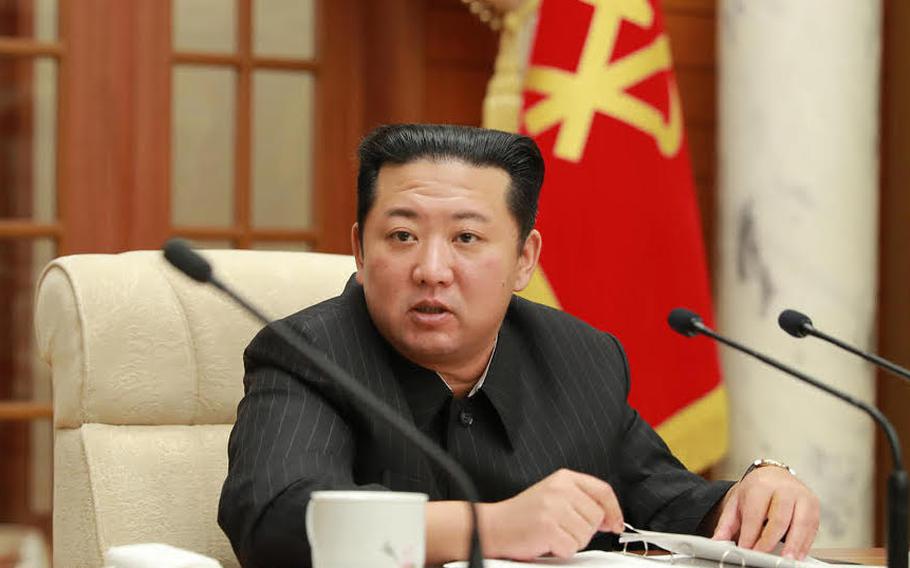
North Korean leader Kim Jong Un attends a meeting of the ruling Workers' Party in Pyongyang, North Korea, on Jan. 20, 2022. (Korean Central News Agency)
Facing an unprecedented, three-way military partnership and a “pugilistic” South Korean president, North Korean leader Kim Jong Un has responded with a belligerent tone toward the South, according to analysts this week.
North Korea announced it will undergo a “decisive policy change” in relations with the South due to its alliance with the U.S., the state-run Korean Central News Agency reported Dec. 31.
The policy shift includes abandoning all efforts to reunify with South Korea, which KCNA described as “a strange clan, who is no more than a colonial stooge of the U.S.”
North Korea’s tone is “on par with past rhetoric” and comes as Kim faces a united front beyond its southern border, Patrick Cronin, the Asia-Pacific security chair at the Hudson Institute in Washington, D.C., said Thursday.
In mid-January, North Korea through KCNA characterized South Korea as its “primary foe,” threatened to annex the country in the event of a war and proposed amending its constitution to do away with the goal of peaceful reunification of the Korean Peninsula.
Kim could be “adjusting to his perception that there are no good diplomatic options to dealing with Washington and Seoul for at least another year,” Cronin told Stars and Stripes by phone.
“I think Kim will want to get back to the diplomatic table, but he’s looking for an opportunity,” Cronin said. “The U.S. is just one of many big actors; Kim still wants to engage with a U.S. that will give him more of what he wants than he sees right now.”
Southern strategy
North Korea’s confrontational stance may be a response “to the more pugilistic and assertive Yoon administration,” he added.
Yoon, a member of the conservative People Power Party, has vowed to meet North Korea’s threats by force by boosting military cooperation with the U.S. and mending diplomatic ties with Japan.
At the same time, Yoon has promised Kim economic incentives in exchange for steps toward denuclearization. Both Yoon and President Joe Biden have repeatedly offered to meet with Kim without preconditions.
In October, a U.S. bomber with South Korean and Japanese fighter jets flew their first-ever airpower drill together. The three held maritime drills in international waters south of South Korea’s Jeju Island this month and in November.
In December, the three activated a real-time, data-sharing system that Yoon, Biden and Japanese Prime Minister Fumio Kishida in 2022 said will “improve each country’s ability to detect and assess” North Korea’s missile launches.
“If North Korea provokes us, we will punish them several times over,” Yoon said during a cabinet meeting Monday.
The communist regime on Sunday launched an intermediate-range solid-fueled ballistic missile and earlier this month fired over 300 artillery rounds toward its southern maritime border.
North Korea’s rhetoric toward the South and its military partners is provocative but “not dramatically different” from its past remarks, particularly when dealing with a conservative South Korean president, according to Rob York, the program director for Regional Affairs at the Pacific Forum foreign policy research institute in Hawaii.
“The ruling ideology in North Korea is essentially anti-Japan, anti-U.S.; and the conservative government in South Korea has really been seen as an extension of pro-Japan collaborationism,” York said by phone Wednesday.
The strengthening of this trilateral partnership “would seem to close the door, not that many of us really thought that it was open, with negotiations with the current government in South Korea,” he said.
North Korea may shift its stance after the South’s National Assembly elections in April; he questioned whether Kim has “genuinely backed away from hoping to reunify the Korean Peninsula under their control.”